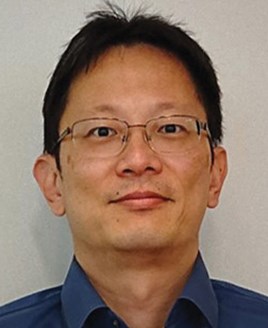
Congratulations on your appointment as RCOphth President in May last year. COVID-19 hit just before your presidency started. This must have been an incredibly challenging time to take the reins. How has the College risen to the challenges?
Thank you. Taking on any new leadership role can be challenging in the first year. Add the global pandemic to that and it certainly feels very daunting still. However, Mike Burdon, my predecessor, and the leadership team at RCOphth, laid the best foundations for me to continue helping fellow ophthalmologists and patients despite the challenges.
Ophthalmology sees the largest number of elective outpatients and performs more surgery than any other specialty in the NHS. It was already under extreme pressure from the increasing demand of the ageing population and prevalence of eye disease and COVID-19 has exacerbated the capacity challenge and backlogs much further than at any recent time. Clinical leads in hospital eye services will be looking at adding extra sessions and other ways to tackle the backlogs. What we need is for National Health Service England (NHSE) and the other three nation’s health systems to help us to get services back on track – to allow the multidisciplinary eye workforce, led by consultants, to restore and expand services and for trainees not to miss out on any more of their training that will delay their career progression.
The RCOphth really rose to the challenge in the first months of COVID-19 by developing guidance and recommendations, initially to ensure as many patients as possible with urgent sight-threatening conditions continued to be looked after, and then to restore services. My thanks to the chairs, officers and College staff for their hard work with this.
We have encouraged innovative ways of working using technology, like video consultations. We worked with specialist societies to recommend adequate PPE, recognising different procedures carried different levels of risk.
There was also a renewed emphasis on collaboration between all those involved in eyecare and we developed emergency eye service pathways with The College of Optometrists. Going forward, RCOphth will continue working with them and NHSE on a much needed transformation of ophthalmic services over the next year. 2021 will continue to be challenging and all those involved in healthcare who have worked incredibly hard will no doubt be feeling the strain. There is light at the end of this long tunnel as the vaccination programme continues to roll out and the infection R rate falls.
Are there professional lessons to be learnt from this devastating pandemic?
Everyone working in the eye services has seen how collaborative working and utilisation of existing and emerging technology allowed essential care of patients to continue during the pandemic. I think COVID-19 accelerated the use of digital technology and this will be here to stay. The need to have proper digital connectivity between primary and secondary care has also been highlighted and the successful roll out of COVID Urgent Eye Service (CUES) is an example of how this has benefited patients.
Another lesson is that we need to make best use of all available resources in time of need as demonstrated by how different Trusts worked together to share capacity and how the independent sector was utilised.
A recent report suggests up to 10,000 patients may have lost some of their sight during the first lockdown. What we have learnt since, is that eye services can and must continue despite a pandemic – it is always about risk assessment and balancing that risk against quality of life for patients, protecting not only patients, but also the workforce.
What do you hope to achieve in your three-year term as President?
I sincerely wish I can make it easier for ophthalmologists to deliver more and better care for patients.
We are working with NHSE/I in the National Outpatient Transformation Programme, which wishes to reduce hospital outpatients by 30% and improve patient pathways and make the best use of the digital tools at our disposal, integrating primary and secondary care. As a key partner and experts in the clinical management of ophthalmology services and patients, we aim to make the programme a success.
The COVID-19 pandemic has significantly impacted on surgical training and I will work hard to ensure that the College leads on improving opportunities for trainees, including involving the independent sector where it’s needed. This has to be done in partnership with Health Education England and the other national education bodies. Trainees continue to miss out due to the closure of elective services and redeployment and we need to work with the health system organisations to reduce this impact and ensure that those affected are not disadvantaged in any way. I am proud of how our trainees have played their part in the pandemic.
I would like to take this opportunity to thank my fellow ophthalmologists, nursing staff, optometrists, orthoptists, healthcare workers and technicians who despite feeling worried for their own safety continued to look after eye patients.
What are your professional and personal motivations?
To always do my best for my family, friends, colleagues and my patients, in the hope I can make a positive difference for all of them. As President I have been given the unique opportunity to try to improve integration between the primary, secondary and independent sectors. I believe more collaboration, not competition, is what will help us increase the sorely needed capacity to prevent avoidable sight loss.
Who has inspired you in your career and why? Who have been your heroes and mentors?
When I was a third year medical student, wanting to find out more about ophthalmology, I knocked on the clinic door of a local ophthalmologist in my home town Kuching. Dr Tiong (Tung Hui) invited me in that day and for the rest of my summer break took me under his wing. His generosity and caring nature was an inspiration, as well as his strong work ethic. Thanks to him, I never looked back and strove to become an ophthalmologist.
I have been extremely fortunate to have been taught by many inspirational people. This included Bruce Noble and Ian Simmons with whom I co-authored a successful eye textbook. For getting me hooked on oculoplastics, Bijan Beigi, Andy Cassels-Brown and Paul Moriarty. I must thank Brian Leatherbarrow, Geoff Rose and Richard Collin, who have given invaluable advice from when I was a young consultant till now.
The College encourages all ophthalmologists to be involved in its work. Our College chairs, officers and past presidents are from diverse backgrounds and ethnicity (both male and female) and this is to be applauded. My past president heroes have been Professor Carrie MacEwan, who has the knack of making those around her feel important and listened to; and Professor Harminder Dua, who showed me that someone with an international background can aspire to lead the College.
What has been the best piece of advice that you have received in your career? What advice would you offer to trainees embarking on a career in ophthalmology today?
A career as a doctor is a lifelong journey of learning and caring, which is why it’s such a privilege. A simple piece of advice I was given which I have taken to heart is to always put my patient’s interest first.
My advice to a trainee would be to learn your craft well, at your own pace and to always remember the basics of patient care. You should definitely choose the subspecialty you love because you have a long career ahead of you.
If you could make every ophthalmologist read one book or paper what would it be and why?
The one textbook is I suspect what most ophthalmologists will have already read: Kanski’s Clinical Ophthalmology: A systematic approach. This is a classic, now in its ninth edition and gives the reader the perfect foundation of knowledge in this field. It certainly helped me pass my fellowship exams!
Your specialty is oculoplastics. What drew you to this area of ophthalmology, and how do you foresee the specialty changing over the next 10 years?
This subspecialty is so varied, with so many eyelid, lacrimal and orbital conditions to learn to manage and a good variety of surgical techniques to master. I enjoy the multidisciplinary aspect which gives me the opportunity to work across specialties, e.g. being part of the skin cancer multidisciplinary team (MDT) and craniofacial team with ENT, plastics, maxillofacial, interventional neuroradiology and neurosurgery. It’s never boring and you never stop learning.
I like that a lot of the surgery we do is visual, requiring a bit of artistry and you have to pay attention to detail as you cannot hide your mistakes.
In the next 10 years, in managing complex cases there will be the need for more MDT input and adopting new technologies like CT guided navigation, 3-D printing, customised orbital implants and using new biologics (for thyroid eye disease).
The 2021 Annual Congress is planned for 24-27 May. What can delegates expect from this year’s Congress?
RCOphth Congress 2021 is a virtual meeting for the first time, with an exciting programme of parallel sessions for the first three days and the subspeciality day on Thursday. The sessions will be available on demand so attendees can take part in one parallel session and watch the rest of that day’s programme at leisure.
As President, I am looking forward to opening our first virtual Congress, full of the high quality talks on a variety of topics that you would expect from the RCOphth. Because it is virtual, we hope that we can welcome all ophthalmologists and other medical and healthcare professionals from across the globe.
We will be announcing exciting new features in the coming weeks, so look out for more details and register here www.rcophth.ac.uk/events-and-courses/annual-congress-2021
COMMENTS ARE WELCOME





